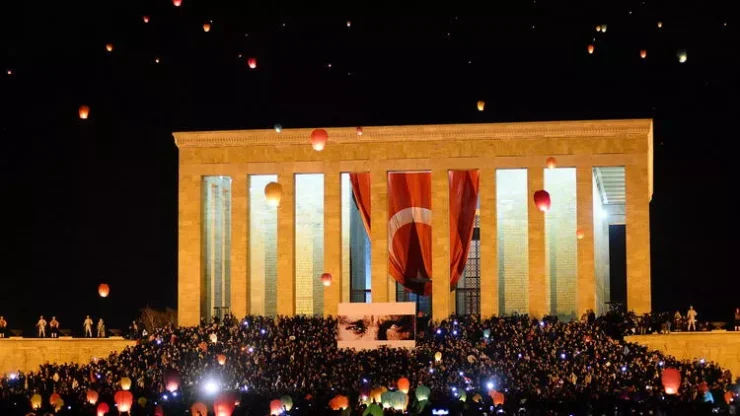In his 57 years of life, Mustafa Kemal Atatürk, the founder of the Republic, went down in world history not only as a commander who successfully led the Turkish nation’s War of Independence, but also as a genius statesman with his revolutions.
Atatürk was born in Thessaloniki in 1881. At the request of his mother Zübeyde Hanım, he started his primary education at Hafız Mehmet Efendi’s neighborhood school. Later, upon the request of his father Ali Rıza Efendi, he transferred to Şemsi Efendi School and completed primary school.
Ataturk voluntarily left the Thessaloniki Mülkiye Rüştiyesi for secondary school education and continued his education at the Thessaloniki Military Rüştiye. Captain Mustafa Efendi, who taught mathematics at this school, gave his gifted student the middle name “Kemal” to distinguish Atatürk from the other “Mustafa” in the class.
After graduating from Thessaloniki Military High School, Mustafa Kemal graduated from Manastır Military Idad with the second rank. In addition to his military education, Atatürk also studied foreign languages and took French lessons in Thessaloniki in the summers.
He then entered the Military Academy in Istanbul in 1899 and graduated in 1902 with the rank of lieutenant. He graduated from the War Academy in 1905 with the rank of staff captain. He was assigned to the 5th Army in Damascus in 1905 for his staff training.
Atatürk, who was awarded the Order of Mecidi of the Fifth Rank for his outstanding services in the Syrian region, was appointed to the Headquarters of the 3rd Army, headquartered in Manastır, Macedonia, in 1907, and was assigned to the staff branch.
While Mustafa Kemal Atatürk was stationed in Manastır and Thessaloniki, he served in the army that suppressed the March 31 Incident in Istanbul in 1909.
In 1910, he was also assigned to the operation organized to suppress the rebellion in Albania. When Italy landed troops in Tripolitania in 1911, he was sent to Tobruk. After successfully leading the Turkish forces in Tobruk and Derne, he participated in the Balkan War in 1912-1913 with the rank of major and served in the corps that took back Edirne from Bulgaria.
Atatürk was appointed as an attaché in Sofia in 1913. At the outbreak of the First World War while he was serving as attaché, Atatürk applied to the Deputy Commander-in-Chief and asked to be assigned to the front.
He was told, “There is always a duty for you in the army. However, since we consider the Sofia Attaché Mission more important, we are leaving you there.” Upon the reply, the Great Leader wrote the following letter to the Deputy Commander-in-Chief Enver Pasha:
“There cannot be a more important and lofty duty than the active duties of the defense of the homeland. While my friends are on the battle fronts and in the firing lines, I cannot serve as an attaché in Sofia. If I am not qualified to be a first class officer, please tell me openly if this is your opinion.”
Upon this, Atatürk was appointed as the Commander of the 19th Division to be formed in Tekirdağ under the 3rd Corps under the command of Esat Pasha in 1915.
The enemies who landed troops on the Gallipoli Peninsula and advanced to Conkbayırı retreated with the attack of the 19th Division forces under Atatürk’s command. Upon this, Atatürk became famous as the “Hero of Anafartalar.” (Atatürk was saved from certain death when a piece of shrapnel hitting his chest during the Conkbayırı offensive hit the watch in his pocket).
Appointed as the Commander of the 16th Corps on the Eastern Front, Atatürk stopped the Russian attacks in 1916 and retook Bitlis and Muş from the enemy, and was promoted to general on this front.
In 1917, he was appointed as the Commander of the 7th Army in Palestine and Syria. In the same year, he traveled to Germany with the Ottoman Sultan Vahdettin and examined the German war fronts.
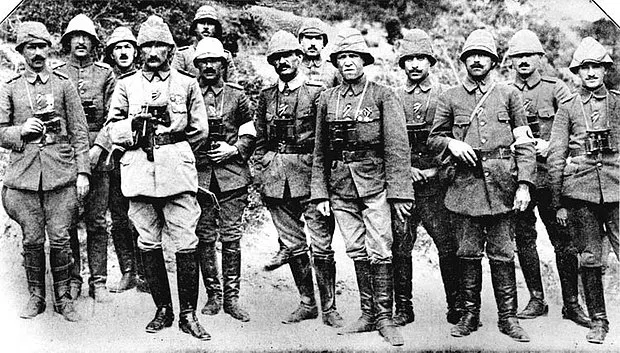


While he was the Commander of the 7th Army on the Syrian front, where he was reassigned in 1918, he returned to Istanbul after the Mondros Armistice Treaty signed at the end of the First World War.
Keeping his aim of liberating the country from enemy occupation secret, he left Istanbul with the duty of Army Inspectorate.
Mustafa Kemal, who landed in Samsun on May 19, 1919 via the Black Sea, published the Amasya Circular on June 22, 1919. He informed the Turkish nation that “the integrity of the homeland and the independence of the nation were in danger and that a congress would be convened in Sivas to save the homeland with determination and resolve”.
He resigned from his duty and military service given by the Ottoman Government and became the president of the congresses convened in Erzurum on July 23, 1919 and Sivas on September 4, 1919.
In these congresses, decisions were taken and announced that “the nation will defend the homeland against enemy occupation, a temporary government will be established for this purpose, a national assembly will be convened, mandate and protection will not be accepted.” (I will look for something here)
The Grand National Assembly of Türkiye (TBMM) was established in Ankara on April 23, 1920, thanks to his efforts. Mustafa Kemal Atatürk was elected President of the Assembly and the Government.
On April 6, 1920, 17 days before the opening of the Turkish Grand National Assembly, the Anadolu Agency (AA) was founded on the instructions of Mustafa Kemal Atatürk. Established to “announce Türkiye’s voice to the world”, AA announced the first laws passed by the Turkish Grand National Assembly. The valuable agency, whose news we still rely on, witnessed every stage of the National Struggle and the War of Independence.
Despite the opening of the Turkish Grand National Assembly and the establishment of a national government, the Ottoman Government and the Entente signed the Treaty of Sèvres on August 10, 1920.
In a statement to the correspondent of the United Telegraph newspaper, the Great Leader Atatürk emphasized that they did not recognize the Treaty of Sèvres and said, “The Treaty of Sèvres, which was directed to destroy our political, judicial, economic and financial independence and to deny our right to live, does not exist for us.”
The Turkish Grand National Assembly announced to the whole world that the Treaty of Sèvres, signed between the Ottoman Government and the Allied Powers, was not accepted.
The advance of the Greek forces, which invaded İzmir with the help of the Entente States, was stopped in 1921 with the First and Second Inönü battles.
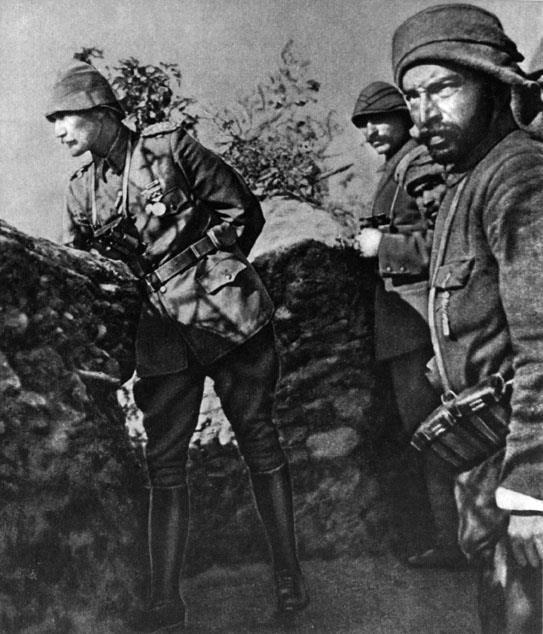


With the Greek army’s renewed offensive on August 23, 1921, the Battle of Sakarya started. Atatürk told the troops, “There is no line of defense, but a territory of defense and that territory is the whole of the motherland. No inch of the motherland may be abandoned without being soaked in the blood of her sons…”
The Turkish army, led by Commander-in-Chief Mustafa Kemal Pasha, concluded the Battle of Sakarya with victory. In this 22-day battle, the Greek army suffered heavy losses.
At the end of this victory, Mustafa Kemal Atatürk was given the rank of “Field Marshal” and the title of “Gazi” by the Turkish Grand National Assembly.
On October 13, 1921, the Treaty of Kars was signed with the Caucasian Republics, and on October 20, 1921, the Treaty of Ankara was signed with the French -excluding Hatay-, where the current Turkish border was drawn.
Under Atatürk’s command, the Turkish army launched the Great Offensive on August 26, 1922 to liberate the homeland from enemy occupation.
At the Battle of Dumlupinar on August 30, 1922, led by Mustafa Kemal Pasha, the Turkish army destroyed most of the Greek army and pursued the fleeing enemy forces, entering Izmir on September 9, 1922.
Following the great military victories that liberated Anatolia from enemy occupation, the Mudanya Armistice Treaty was signed on October 11, 1922 and the Entente powers withdrew from the Turkish territories they had occupied.
The Treaty of Lausanne was signed on July 24, 1923 between the Turkish delegation and Britain, France, Italy, Japan, Greece, Romania and Yugoslavia.
The Great Leader said of the Treaty of Lausanne, “This treaty is a document that expresses the collapse of a great assassination against the Turkish nation, which had been prepared for centuries and was thought to have been completed with the Treaty of Sevres.” He said.
After the War of Independence, the Turkish Grand National Assembly declared the Republic on October 29, 1923. Mustafa Kemal Atatürk was elected President. Atatürk was elected President 4 times in a row until his death in 1938, making him the longest serving President.
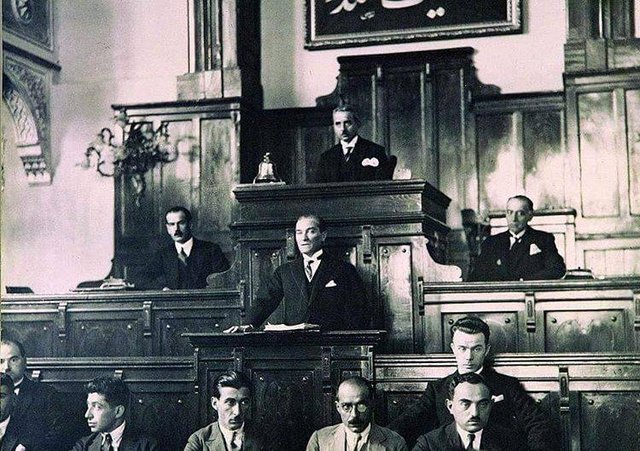


Gazi Mustafa Kemal was given the surname “Atatürk” on November 24, 1934 by Law No. 2587 and it was forbidden for others to use this surname.
Mustafa Kemal Atatürk launched the Five-Year Industrial Plan in 1933 to mitigate the effects of the 1929 World Economic Depression and accelerate the country’s development. In the same period, important steps were taken in foreign policy.
Atatürk made intensive diplomatic efforts for Hatay to join the motherland, and his goal was realized in 1939 after his death.
In his 57 years of life, Mustafa Kemal Atatürk worked tirelessly for the independence of his nation and homeland with the principle of ‘either independence or death’ and emerged victorious from every struggle he entered.
With his military and political genius, he inscribed his name in Turkish and world history. On November 10, 1938, at the age of 57, he passed away at 09.05 at the Dolmabahçe Palace. His funeral was sent to Izmit by a large crowd on November 19, and from there to Ankara by the train he used in all his travels around the country, accompanied by the people. On November 21, 1938, he was laid to rest in his temporary tomb in Ankara Ethnography Museum with a very big ceremony. On November 10, 1953, he was moved to Anıtkabir where he will rest eternally.
While Atatürk’s death was met with great sadness not only in Türkiye but all over the world, foreign statesmen and newspapers issued many statements and messages. Here are a few examples;
- An outstanding person who devoted himself for the development of international understanding cooperation and peace a revolutionist who realized extraordinary reforms the first Leader who fought against imperialism and colonialism. A unique Statesman respectful to human rights pioneer of worldwide peace who never discriminated people according to their color religion or race through out his life founder of Turkish Republic. – UNESCO’s definition of Mustafa Kemal Atatürk
- The name of Atatürk brings to mind the historic accomplishments of one of the great man of this century, his inspired leadership of the Turkish People, his perceptive understanding of the modern world and his boldness as a military leader. It is to the credit of Atatürk and the Turkish People that a free Türkiye grew out of a collapsing empire and that the new Türkiye has proudly proclaimed and maintained its independence ever since. Certainly there is no more successful example of national self reliance then the birth of the Turkish republic and the profound changes initiated since then by Türkiye and Atatürk. – John F. Kennedy (President of the United States)
- My sorrow is that, it is no longer possible to fulfill my strong wish to meet this great man. – Franklin Roosevelt (US president)
- One of the most talented leaders of the postwar era. – New York Times
- I have had private and official conversations with fifteen monarchs and presidents. I don’t remember being so crushed as I was tonight. Mustafa Kemal has the mystery of a great power of spirit. – Sir Charles Townshend, British General, 1922
- Such a radical change in the life of a nation in so little time is rare. Those who have done these extraordinary deeds have undoubtedly earned the title of ‘great men’ in the fullest sense of the word. And for this Türkiye should be proud. – Eleftherios Venizelos, (Prime Minister of Greece) 1933
- The death of Atatürk, who saved Türkiye in the war and resurrected the Turkish nation after the war, is the greatest loss not only for his country but also for Europe. The sincere tears shed by all classes of people for him are nothing but a fitting tribute to this great hero and the Father of modern Türkiye. – Winston Churchill, (British Prime Minister) 1938
- Atatürk is such a person that he is not imaginary. He knows what he wants, does what he knows, and does not ask for what he cannot do. – Austrian sculptor Krippel
- Atatürk left Türkiye without a single enemy. This is something that no other head of state of our time has achieved. – German Volkischer Beobachter Newspaper
- No name in our time has generated as much respect as Atatürk’s name. – Observer newspaper, England
- Atatürk was the leader not only of the Turkish nation but of all nations fighting for their freedom. Under his directives, you gained your independence. We have also achieved our freedom by walking that path. – Sucheta Kripalani, Head of the Indian Parliamentary Delegation
- The world has lost one of the most remarkable men of our time. – Palestine newspaper, Israel
- One of the most extraordinary figures of his time, perhaps of all history. – Egyptian Newspaper
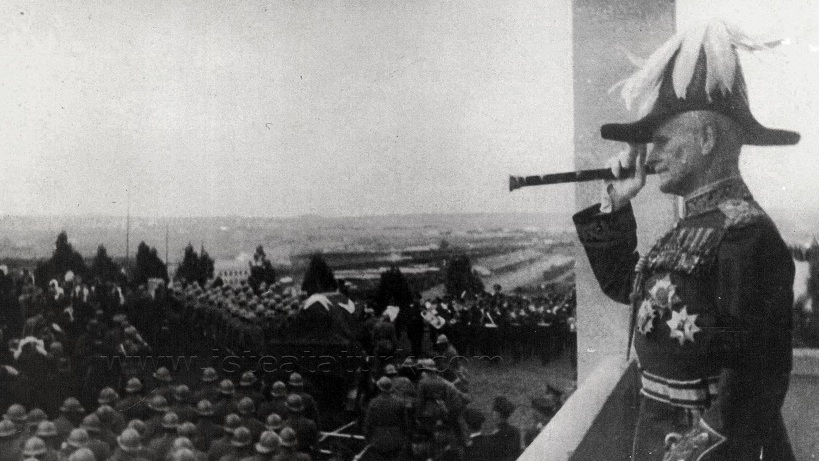


This year, on the 84th anniversary of the death of the Great Leader Mustafa Kemal Atatürk, citizens flocked to Anıtkabir after the state ceremony.
Thousands of young, old and children from various cities paid homage to Atatürk with Turkish flags, Atatürk posters and flowers.
Citizens prayed in front of the mausoleum and left the flowers they had brought. Visitors shed tears during the emotional moments.
Every November 10, Türkiye remembers its ancestor with respect, longing and gratitude, mourns his great loss and repeats his promise every year.
“We will protect your trust”
